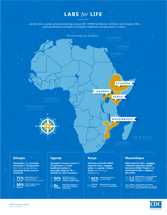CDC Helps Nigeria Make Strides against a Leading Cause of TB Transmission

Despite being entirely preventable and treatable, tuberculosis continues to take an enormous toll worldwide. TB now ranks alongside HIV/AIDS as the world’s leading infectious disease killer, with 1.5 million TB-related deaths each year; another 9.6 million people become ill with TB annually.
Highly contagious, TB can spread quickly in health facilities that do not have adequate measures in place to prevent patients with the disease from passing it on to others – a situation all too common in developing countries with limited resources to devote to basic disease control. In fact, hospitals and clinics are some of the most common places for TB to be transmitted, putting at grave risk both healthcare workers and patients. TB risk is particularly high for people living with HIV, because they have weakened immune systems that make them much more susceptible to becoming ill from TB.
Preventing transmission of TB in health facilities is a top priority for CDC, whose experts are on the ground, collaborating directly with Ministries of Health to help them adopt the most effective ways to prevent and control the disease.
A novel pilot program to reduce TB transmission in Nigeria
In Nigeria, a country with one of the highest TB rates in the world (approximately 100,000 people contract the disease in 2014), CDC partnered with the government on a pilot program in 2015 to test the effectiveness of putting simple, inexpensive TB control efforts in place in hospitals and clinics. The partnership focused on seven healthcare facilities supported by PEPFAR, which collectively provide services to nearly 1.5 million people and treat 1,600 patients with TB each year.
An initial assessment conducted by CDC, the Nigerian Ministry of Health, and other partners found that health staff in the seven Nigerian facilities did not have the expertise needed to help prevent the spread of TB. For example, healthcare workers had not received training on how to educate patients and visitors on the best ways to reduce the risk of contracting the disease, patients were not being routinely screened for TB, and most health facilities did not have specific areas where coughing patients could be removed from the general patient population. The partnership also found poor ventilation in many health facilities and no way to reduce the concentration of TB bacteria in the air, which can fuel the spread of the disease.
Small investments translate into huge gains in the fight against TB
With these findings in hand, CDC worked in collaboration with its partners to develop and roll out a plan to improve healthcare workers’ knowledge of basic TB infection control measures. The CDC-led partnership trained more than 50 healthcare workers – mainly physicians and nurses – on how to promptly identify and treat people with TB, improve ventilation in waiting areas, and wear personal protective equipment to reduce their own risk of contracting the disease, and they have trained an additional 200 healthcare workers.
Health staff were also given low-cost educational posters and pamphlets that CDC created for display in the health facilities. And, together, they developed strategies to collect and safely store sputum samples, and to make sure TB patients could receive care quickly.
Finally, to ensure important changes would stick for the long term, health staff were assigned specific roles to carry out infection control practices at each facility – and guarantee that public health guidelines were being followed.
These changes have paid off. Today, important infection control measures are still in place in Nigeria. Similar pilots have been conducted in India, Mozambique, Dominican Republic, and Zimbabwe, and CDC has shared tools developed for the Nigeria program for use in other countries.
Giving frontline healthcare workers the knowledge they need to control the spread of TB is a critical first step in the long road ahead to end the global epidemic. It is also a cost-effective one: small investments in improving local health systems can save countless lives in Nigeria – and around the world.
Read the full MMWR here
Labs for Life Infographic:

Get email updates
To receive email updates about this page, enter your email address:
Contact Us:
- Centers for Disease Control and Prevention
1600 Clifton Rd
Atlanta, GA 30333 - 800-CDC-INFO
(800-232-4636)
TTY: (888) 232-6348
24 Hours/Every Day - Contact CDC-INFO
 ShareCompartir
ShareCompartir


